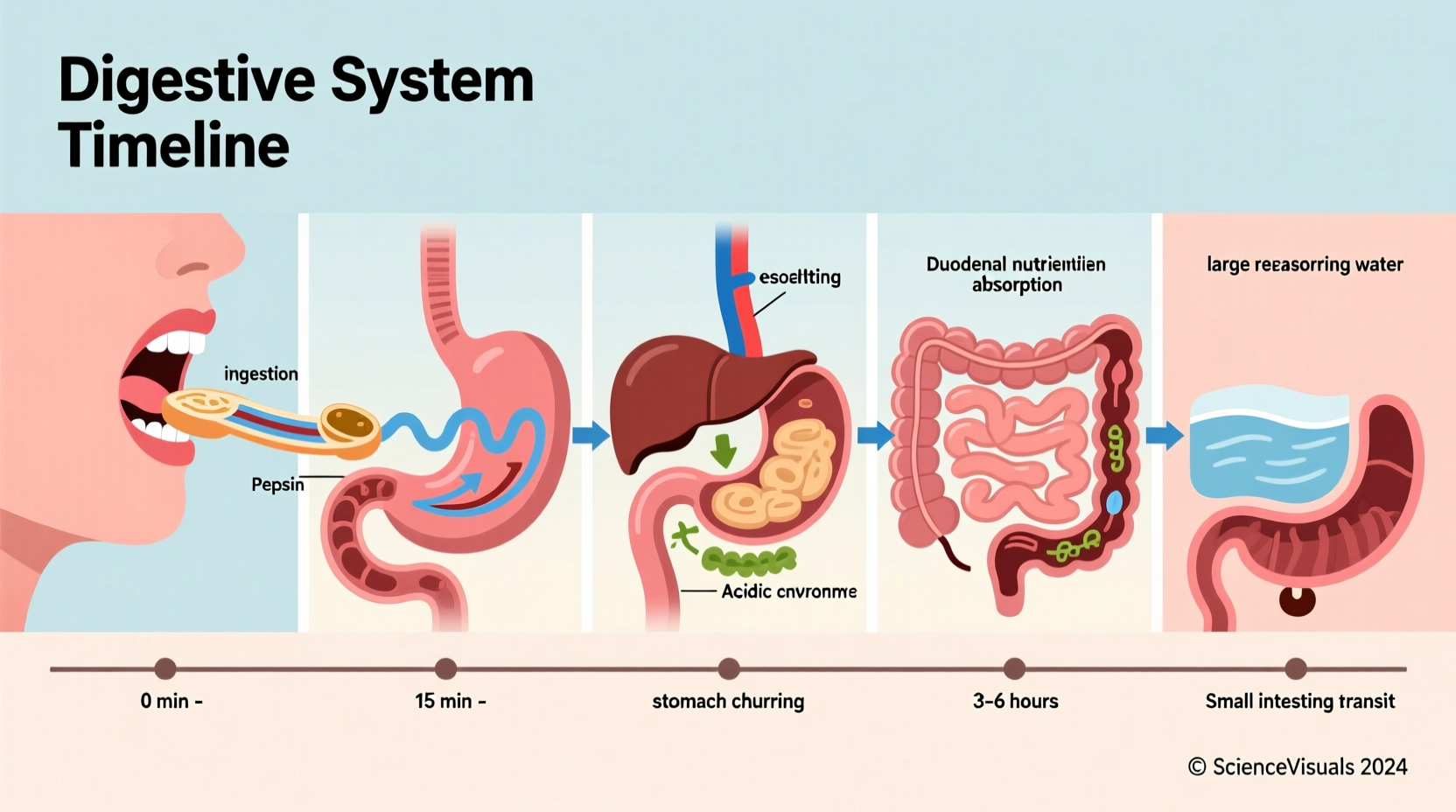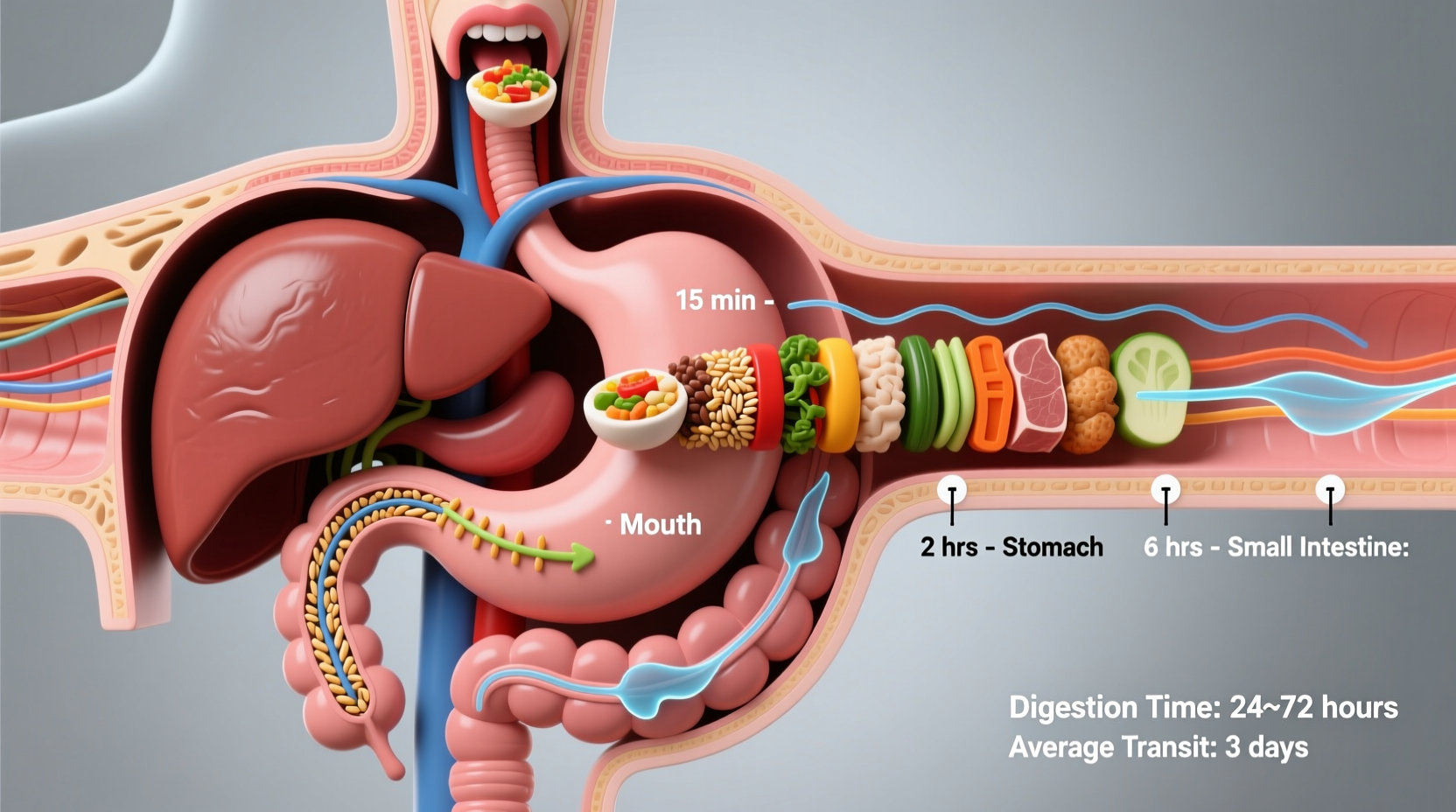Digestion isn't a single event but a complex journey through your digestive system. Understanding exactly how long is digestion of food requires examining each stage of the process and the variables that influence timing. This comprehensive guide breaks down the science behind digestion timelines with evidence-based information you can trust.
The Complete Digestive Timeline: From Bite to Elimination
When you ask how long is digestion of food, the answer depends on which part of the process you're measuring. Let's follow food's journey through your system:
Stage 1: Mouth and Esophagus (Seconds to Minutes)
Digestion begins the moment food enters your mouth. Chewing breaks food into smaller particles while saliva starts breaking down carbohydrates. This mechanical and chemical process typically takes 15-30 seconds before swallowing sends food down the esophagus in about 8-10 seconds.
Stage 2: Stomach Processing (2-5 Hours)
Your stomach serves as both a storage tank and chemical processor. Here, gastric juices containing hydrochloric acid and enzymes further break down food into a liquid mixture called chyme. The National Institute of Diabetes and Digestive and Kidney Diseases confirms that stomach emptying time varies significantly based on meal composition:
- Carbohydrate-rich meals: 2-3 hours
- Protein meals: 3-4 hours
- Fat-heavy meals: 4-5 hours or longer
This explains why that heavy cheeseburger lingers longer than a fruit salad.
Stage 3: Small Intestine Processing (2-6 Hours)
Nutrient absorption primarily occurs in the small intestine, where chyme mixes with bile and pancreatic enzymes. Most nutrient absorption happens here, with the Mayo Clinic noting that food typically spends 2-6 hours in this critical phase. The small intestine's enormous surface area (about 250 square meters) allows efficient nutrient extraction before moving undigested material to the large intestine.
Stage 4: Large Intestine Processing (10-59 Hours)
The colon absorbs remaining water and electrolytes while gut bacteria ferment undigested carbohydrates. This final stage shows the greatest variability in how long is digestion of food, ranging from 10 hours in people with faster transit to 59 hours in those with slower digestion. The American Journal of Gastroenterology published research showing that fiber intake significantly impacts this phase, with higher fiber diets generally promoting faster transit.
Factors That Influence Your Personal Digestion Timeline
While average digestion time provides a general framework, numerous factors create significant individual variation in how long is digestion of food for you specifically:
Food Composition Matters Most
The macronutrient profile dramatically affects digestion speed. Here's how different food types typically move through your system:
| Food Type | Stomach Emptying Time | Total Digestion Time | Key Influencing Factors |
|---|---|---|---|
| Watermelon & citrus fruits | 20-30 minutes | 12-24 hours | High water content, simple sugars |
| Leafy greens & non-starchy vegetables | 45-60 minutes | 18-30 hours | Fiber content, enzyme presence |
| Cooked grains & starchy vegetables | 90-120 minutes | 24-36 hours | Complex carbohydrates, fiber type |
| Lean proteins (chicken, fish) | 2-3 hours | 24-48 hours | Protein structure, cooking method |
| Fatty foods & red meat | 4-5+ hours | 48-72+ hours | High fat content, protein density |
Individual Biological Factors
Your unique physiology plays a crucial role in determining how long is digestion of food for you:
- Age: Digestion typically slows with age due to decreased stomach acid production and slower intestinal motility
- Gender: Women often experience slower gastric emptying than men, particularly during certain menstrual cycle phases
- Gut microbiome: Your unique bacterial composition affects fermentation speed and efficiency
- Hydration status: Proper water intake keeps digestive processes moving smoothly
- Physical activity: Regular movement stimulates intestinal contractions

When Digestion Time Signals Health Concerns
While normal digestion time ranges from 24-72 hours, certain patterns may indicate underlying issues:
- Consistently under 24 hours: May indicate diarrhea, malabsorption, or inflammatory conditions
- Regularly over 72 hours: Could signal constipation, hypothyroidism, or motility disorders
- Sudden changes: Unexplained shifts in digestion time warrant medical attention
The American Gastroenterological Association recommends consulting a healthcare provider if you experience persistent changes in digestion time accompanied by pain, unexplained weight loss, or blood in stool.
Practical Tips for Supporting Healthy Digestion
While you can't completely control how long is digestion of food, these evidence-based strategies promote optimal digestive function:
Dietary Adjustments
- Include both soluble and insoluble fiber from diverse plant sources
- Stay consistently hydrated throughout the day
- Chew food thoroughly to reduce stomach workload
- Consider food combining principles (separating certain food types)
- Incorporate fermented foods for probiotic support
Lifestyle Modifications
- Maintain regular meal timing to support circadian digestive rhythms
- Engage in moderate physical activity after meals
- Manage stress through mindfulness practices (chronic stress slows digestion)
- Avoid lying down immediately after eating
- Get adequate sleep to support gut-brain axis communication
Common Misconceptions About Digestion Time
Several myths persist about how long is digestion of food. Let's clarify:
- Myth: Food rots in your stomach if it stays too long
Fact: Stomach acid prevents bacterial growth; prolonged stomach retention relates to motility issues, not decomposition - Myth: Digestion time directly correlates with weight gain
Fact: Caloric balance determines weight changes, not digestion speed alone - Myth: All fiber speeds up digestion equally
Fact: Soluble fiber can actually slow gastric emptying while insoluble fiber promotes bowel regularity
Understanding Your Personal Digestion Pattern
Tracking your own digestion can provide valuable insights. Try this simple method:
- Eat a food with distinctive markers (like corn or beets)
- Note the exact consumption time
- Monitor when you first see evidence in stool
- Repeat over several days for more accurate assessment
This practical approach to understanding how long is digestion of food for your unique system can help identify patterns and potential concerns.
Frequently Asked Questions
Here are answers to common questions about digestion time:











 浙公网安备
33010002000092号
浙公网安备
33010002000092号 浙B2-20120091-4
浙B2-20120091-4